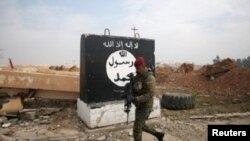Iraqi forces are pushing ahead with their crackdown on Islamic State's ongoing insurgency, despite the pause in assistance from the United States and coalition partners.
The Iraqi military's Security Media Cell published photos Monday of a raid in Salahuddin province claiming to have destroyed three IS hideouts while recovering explosives, bomb-making materials and key documents.
"The Iraqis are actively conducting D-ISIS operations," coalition spokesman Col. Myles Caggins confirmed to VOA, using an acronym for the terror group.
The Iraqi operation is one of the first since the U.S.-led coalition announced Sunday it was putting efforts to assist and train Iraqi forces in the fight against IS on hold in order to focus on protecting forces from attacks by Iranian-backed groups.
"This has limited our capacity to conduct training with partners and to support their operations," the coalition said. "We have therefore paused these activities, subject to continuous review."
The pause, sparked by what U.S. officials describe as a monthslong, intensifying campaign by Iranian-backed militias to target U.S. personnel, and concerns about Iranian threats to retaliate for the U.S. airstrike that killed Iranian Quds Force commander Qassem Soleimani near Baghdad, comes at a precarious time.
IS in Iraq 'alive and kicking'
For months, top U.S. counterterrorism officials have been warning the collapse of IS's self-declared caliphate in Iraq and Syria has done little to deter the estimated 14,000 fighters who still roam free.
"The insurgency is alive and kicking in northwest Iraq for sure," Russell Travers, acting director of the U.S. National Counterterrorism Center, warned in early November. "There are already no-go areas at night. We see ISIS flags, and we see small areas where Sharia is being implemented."
Top U.S. and coalition military officials have also raised concerns about the ability of Iraqi forces to operate without substantial help.
A recent inspector general report found the Iraq military was "unable to retain control of territory cleared of ISIS in Salah ad Din province, and has limited access to ISIS support zones in both Salah ad Din and Diyala provinces."
"CJTF-OIR said that most commands within the ISF (Iraqi Security Forces) will not conduct operations to clear ISIS insurgents in mountainous and desert terrain without Coalition air cover, intelligence, surveillance, and reconnaissance (ISR), and coordination," November's report said, adding it appeared little progress had been made in the previous nine months.
"Bottom line is Iraq loses the anti-ISIS fight without U.S. support," according to Jennifer Cafarella, research director at the Washington-based Institute for the Study of War (ISW). "The question is merely how badly and how fast."
US officials: IS threat overstated
Still, some officials have pushed back, arguing that to some extent, the threat from a resurgent IS has been overstated.
In particular, they point to the terror group's unwillingness or inability to take advantage of the recent U.S. tensions with Iran.
"It's surprising that they haven't found a way," a senior U.S. defense official told VOA. "It says something about what the SDF [Syrian Democratic Forces] and the Iraqis have done."
Coalition officials also contend that Iraqi forces have not gotten the credit they deserve.
"Daesh has lost the capability to launch large-scale attacks in Iraq," British Maj. Gen. Gerald Strickland, the coalition's deputy commander, said in a statement Sunday, using an Arabic acronym for the terror group. "This speaks volumes to the dedication of the Iraq Security Forces and their desire to bring stability back to their country."
Meanwhile, U.S. officials said the pause in assistance to Iraqi forces does not mean U.S. forces will hesitate to respond to IS threats.
"When and where ISIS presents a threat to our troops, we will conduct operations with our partners to eliminate the threat," Caggins said.





